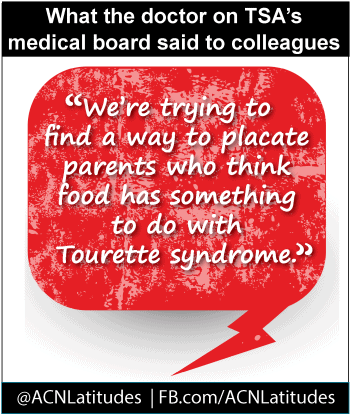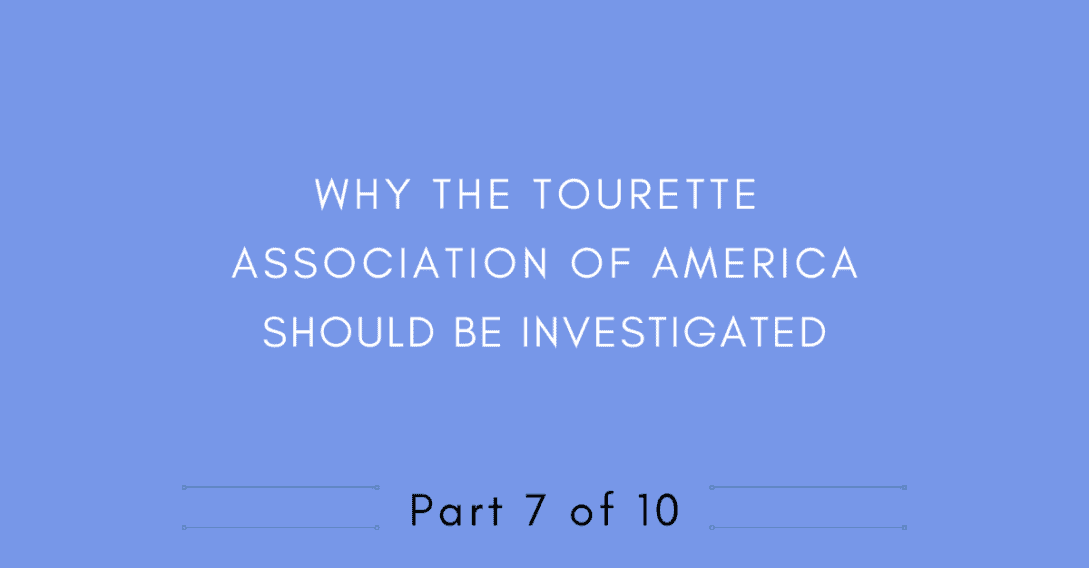Why the Tourette Association of America Should Be Investigated: Part 7
 Sheila Rogers DeMare, Director Association for Comprehensive NeuroTherapy
Sheila Rogers DeMare, Director Association for Comprehensive NeuroTherapy
The TSA and our organization had a liaison relationship for a few years. This made it seem the TSA was interested in integrative therapies. However, far from being interested, they sought to stifle our message and discourage people from trying natural approaches.
My first encounter with a TSA medical board member was at an international scientific symposium in 1992. It was organized for practitioners and researchers. I attended because I wanted to see what I could learn. I also hoped to find a willing ear open to hearing about what our organization was doing.
to hearing about what our organization was doing.
Things got interesting at the conference luncheon. Not knowing anyone there, I took a seat at the first table I saw. Once the chairs were filled, everyone introduced themselves—physicians, psychiatrists, and clinical psychologists. When it was my turn I said I was a school psychologist representing our organization.
The doctor to my right then introduced himself and said, “I’ve just come from a committee meeting of the medical board. We’re trying to find a way to placate parents who think food has something to do with Tourette syndrome.” Did he really say that!?
I spoke up: “Some families do find that certain foods make their child’s tics worse.” His reply was, “Listen, if bananas are causing Tourette syndrome, we want to know about it!” That brought a few laughs. He announced that as of now he was the board representative for alternative therapies. He said he made the mistake of leaving the meeting room, and when he came back, he had been assigned the task.
The TSA website carries a lengthy document warning families against seeking help beyond what the TSA offers. You have to wonder what the agenda is when their preferred treatments include medications that can cause severe impairment and even, in rare cases, death.
The liaison’s role
Aware of a high level of public interest in natural and alternative therapies, the TSA conducted a 1992/93 survey requesting doctors and families to let them know what alternative therapies had proven helpful for Tourette syndrome. Sue Levi-Pearl, former manager of public relations and communications at the TSA, told me that they would publish the survey results after the doctor presented them at a TSA conference in Texas. I was invited to co-present at the session.
I prepared my talk based on feedback from families and physicians and put together the first issue of our newsletter. At the conference hotel, I ran into the doctor. I asked if he’d like to meet to coordinate our presentations. He declined. As I was walking away, a physician approached him. “I see you’re talking on alternative therapies later. Is there a diet connection?” “No. Some people think so but it’s only a coincidence.” “Oh, it’s only a coincidence,” she replied, trusting the TSA expert.
That afternoon, about a hundred people, mostly parents, crammed into a small seminar room. I could sense how hopeful they were. The doctor spoke first, giving an account of the TSA survey and explaining which efforts (see below) were reported as helpful to some people for reducing Tourette syndrome symptoms. After mentioning each intervention, he interjected something derogatory about it, in an obvious effort to quash anyone’s hopes or plans to give it a try.
Three approaches were reportedly found helpful based on the TSA survey. The speaker’s negative comments are summarized:
- The Feingold diet: He said he knew of a case where someone ended up in the hospital from trying this diet. Note: The main focus of the Feingold approach includes eliminating foods with chemical additives, especially dyes and preservatives. Studies confirm that this approach can be helpful for some and there is nothing inherently dangerous about it.
- Nutritional supplements: With a tone of authority, he said “no one in the room” needed nutritional supplements except menstruating females, who might need iron. He then admitted that the only course in nutrition he’d ever taken was a half-day session in medical school on the topic of cafeteria food.
- Environmental medicine: He said he’d heard how someone went to an environmental physician, spent a lot of money, and it didn’t help. He later admitted, “I’m not saying that sometimes we don’t do the same thing.”
By now the session was two-thirds over and I had to stand up to remind the doctor that I was also speaking. I spent the remaining short time trying to undo the damage he had done. In 1996 I was told no one on the board was interested in natural or alternative efforts, though later a new liaison filled that role for a short time. The survey results were never published.
How the TSA keeps the negative message on nondrug therapies alive
Here’s a classic example of how the TSA distorts the message about nondrug approaches. This is excerpted from a two-part article by a member of the TSA medical advisory board, Contemporary Pediatrics August 2004: “Tourette syndrome—much more than tics: Part 2.”
Dispelling misconceptions about the management of Tourette syndrome
- FALLACY: Dietary modification, allergy testing, and environmental allergen control can minimize tics.
- FACT: Despite the popular appeal of these approaches, any role they might have in the management of tics has yet to be proved.
The statement is not a fallacy! The TSA has received many positive reports from families and doctors that contradict their claim. Their spin in this featured section of the report makes the reader assume that studies have proven that diet, allergy approaches and environmental controls have been shown to be unhelpful.
This type of misleading text is woven throughout their literature. Jane Brody of the New York Times cited the above report in a feature article on Tourette syndrome. Her last paragraph says that the author “cautioned against a common tendency for families to use a variety of alternative remedies and dietary restrictions, since none have proved useful.”
So now these approaches are not just portrayed as useless, but readers should be concerned about the consequences of even trying them! It takes a long time to undo negative press like this, and the fault does not lie with Jane Brody.
What the TSA really wanted
The TSA has major funding, a large staff, and extensive family and practitioner memberships. Yet in 1997, they asked our small group to collect anecdotal reports, request families to log observations on environmental factors, put everything in a database, get double-blind studies going—and hand it all over to the medical board so they could review it.
Meanwhile, through their literature and conferences they were deliberately discouraging people from exploring these same therapeutic efforts. By having a liaison relationship with our organization, the TSA could pretend they were responding to the ongoing cry from families for safer and more effective therapies for Tourette syndrome.
Concluding articles in the series:
Part 8: Pleas to the TSA to put families first and tell the truth about non-drug approaches do little good.
Part 9: The TSA controls and censors the media message of our organization, blocking information on integrative therapies for Tourette syndrome from reaching the public.
Part 10: Moving forward.
| Read the Other Parts of this Series: | ||||
| Part 1 | Part 2 | Part 3 | Part 4 | Part 5 |
| Part 6 | Part 7 | Part 8 | Part 9 | Part 10 |










Hi Sheila
I can and can’t believe this. I can believe it because I have myself experienced people in key roles being dismissive and closed-minded. I can’t believe it because it is astonishing how blinkered people can be? And, given those people have such a key role to play in supporting TS sufferers, do they realize how damaging their actions are?
I reminded my little girl of 11 just this morning that a lady she does not know in America wrote a book which changed the course of her life…and saved it. Had I not come across your book, Sheila, she would probably be taking the zombie aka TS drugs by now and have had significant negative psychological impact by having to cope with tics in school and everyday environment, let alone the physical strain of having to cope with tics.
Actually, what your book showed was that many TS sufferers need not tic, or tic as badly, with a little knowledge. The mental health damage and physical exhaustion can be avoided.
So, to the TSA professionals reading this, please keep an open mind and listen to Sheila Rogers. She has dedicated most of her life to helping others by sharing what she has learned. If she appears to be attacking your organisation, you must understand that she is passionate about what she has learned and to not share this knowledge and experience with others is criminal.
I write this as the mother of a child diagnosed with TS who is leading a normal life thanks to Sheila sharing the findings of families and forward-thinking physicians. My daughter’s life would have been far from normal if I had not found her book by chance on Amazon.
Please put aside the politics and share her work with those TS sufferers in need…in doing so, you could transform people’s/children’s lives just like my daughter’s was.
As parents, we may have spent our lives training as different non-medical professionals, e.g. accountants, lawyers etc but we are professionals or experts in the field of observation of our own children as we take care of the 24 x 7 x 365. We are effectively conducting life-long research in observing the development of our children.
The potential negative impact of nutrition and our environment is real and cannot be ignored…whether this manifests through tics, allergic response, neurological or behavioural symptoms, or other damage. I hope that you will allow and support these non-invasive, non-intrusive treatments or indeed simply education, for those who would benefit.
Penelope, I apologize for being late in responding to your fabulous comment! It was so heartening to read that our efforts made a difference for you, across the ocean. What came across to me was determined efforts you made to help your daughter so she could avoid psychiatric medications, And, having seen her wonderful recovery from Tourette syndrome, the frustration you feel knowing that your voice is ignored by doctors and the Tourette Syndrome Association. You are so right that most parents dealing with tics and related symptoms watch their child closely and know when something is helping or not. Of course, when someone’s physician doesn’t know that diet can affect the nervous system, it’s time to find a new doctor! I will share your comment in our premium membership newsletter that goes out on Sunday evenings. Thank you for taking the time to write, it is much appreciated.